Photographs: Reuters
Even more so for the organisers of a sporting event, cocking a snook at the government would have been unthinkable; in any case, most sports bodies have become the fiefdoms of politicians.
In Indira Gandhi's time, an English tour of India was nearly cancelled because the government did not want to issue visas to English players who had breached the sporting boycott of South Africa.
But the Indian Premier League, or IPL, which went eyeball-to-eyeball with the government, lives to tell the tale. To boot, it delivered a surprise punch to Home Minister P Chidambaram, who is not known to be one who forgives and forgets easily.
Text: Business Standard
IPL: An accidental global brand
Image: IPL commissioner Lalit ModiPhotographs: Reuters
It was a big risk, taking a domestic tournament to another continent. But the tournament has been a resounding success.
This has been possible because of many things. First, Indian cricket is no longer run by blinkered revenue collectors of the pre-liberalisation era. Jagmohan Dalmiya first showed the game's business potential, which is being harvested to the hilt now because of the entrepreneurial spirit of Modi & Co.
IPL: An accidental global brand
Image: Yuvraj Singh celebrates with Kumar Sangakkara after claiming his second hat-trick of the tournament.Photographs: Reuters
This year, IPL is estimated to have brought in nearly Rs 1,300 crore (Rs 13 billion) - overnight making it one of the biggest businesses in the entertainment-sports-media space.
This consists of Rs 400 crore (Rs 4 billion) that Multi Screen Media, which owns official broadcaster SET Max, made through advertising; Rs 450 crore (Rs 4.5 billion) that Board of Control for Cricket in India earned from sponsorships, franchisee fee, tickets, etc; Rs 200-225 crore (Rs 2-2.25 billion) made by the franchisees who own the eight cricket teams; and Rs 150-200 crore (Rs 1.5-2 billion) from international distribution.
The overall profit margin is a gravity-defying 50 per cent.
IPL: An accidental global brand
Image: A dejected Adam Gilchrist walks back to the pavillionIPL was also a sporting success. The teams that finished the last and second last in the first edition clashed in this year's final, and last year's bottom-placed team won - thereby underlining the unpredictability of the game.
Cricket pensioners like Adam Gilchrist and Mathew Hayden showed today's players the stuff they were made of. New talent, like Manish Pandey who became the first Indian to score an IPL century, came to the fore, while old hands like R P Singh resurrected themselves.
The matches were not mere run fests; the playing conditions in South Africa kept most of the scores in the range of 150 plus/minus 20 per cent, and made for exciting finishes.
IPL: An accidental global brand
Image: Bollywood stars Shilpa Shetty, Preity Zinta and ShahRukh Khan (L-R) address a news conference of the Indian Premier League (IPL) T20 cricket tournament in Cape Town.Photographs: Mike Hutchings/Reuters
More than anything else, though, the success of IPL's second edition reaffirms the power of television, which makes geography irrelevant and casts aside territorial obstacles to business.
IPL: An accidental global brand
Image: Sachin Tendulkar's birthday partyPhotographs: Reuters
It was television that made a match between Deccan and Bangalore at New Wanderers Stadium in Johannesburg worth the advertisers' money. In a way, Mr Chidambaram seems to have played a role in building a global brand out of India.
Everything considered, that is an extraordinary achievement when you consider that IPL was born as a reaction to Subhash Chandra's Indian Cricket League. Now, what was that?

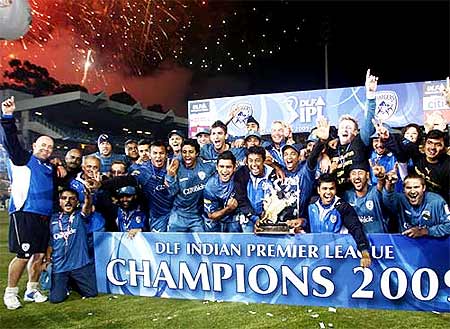

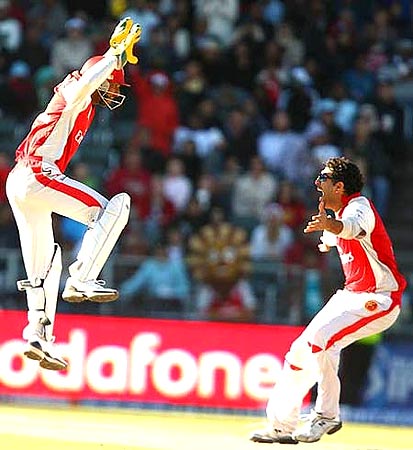
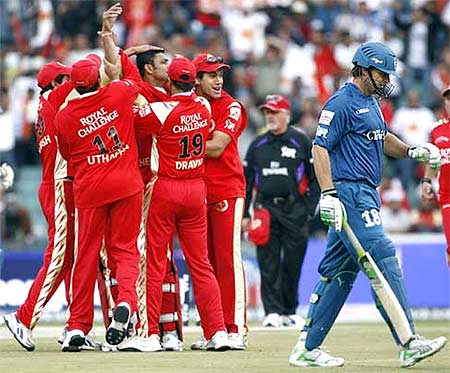
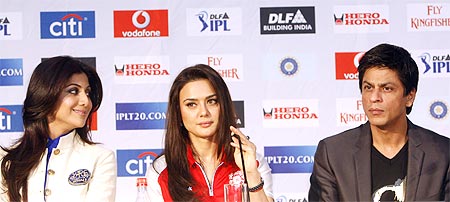
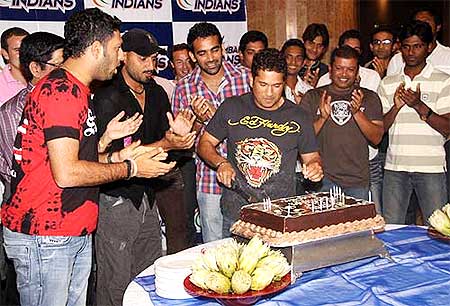
article